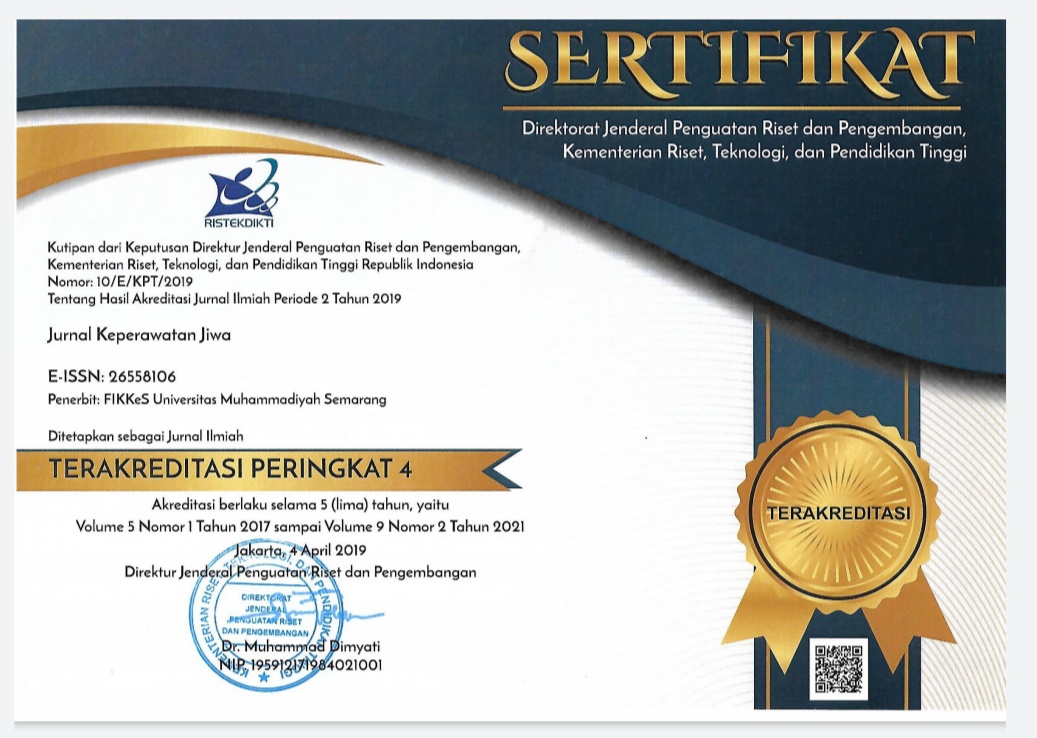Analisis Bentuk Pengabaian yang Dialami Lansia yang Tinggal Bersama Keluarga
(1) STIkes Payung Negeri Pekanbaru
(2) Fakultas Kedokteran, Universitas Andalas Padang
(3) Fakultas Ilmu Sosial dan Ilmu Politik, Universitas Andalas Padang
(4) Fakultas Kedokteran Psikologi, Universitas Andalas Padang
(*) Corresponding Author
Abstract
Meningkatnya jumlah lansia perlu diperhatikan pengasuhan yang diberikan oleh keluarga berupa pemenuhan kebutuhan fisik, pskologis, dan finansial sehingga lansia tidak terabaikan. Terdapat jenis pengabaian yang dialami lansia ketika tinggal bersama keluarga yaitu pengabaian fisik, psikologis, dan finansial.Tujuan penelitian ini adalah mengeksplorasi bentuk pengabaian yang dialami lansia berdasarkan pemenuhan kebutuhan fisik, psikologis, dan finansial. Jenis penelitian adalah kualitatif. Teknik sampling yang digunakan adalah purposive sampling dengan jumlah sampel 6 orang informan lansia. Analisis data menggunakan pendekatan analisis tematik. Hasil penelitian menunjukkan dari hasil wawancara dengan lansia didapatkan dalam pemenuhan kebutuhan fisik lansia tidak menjadi kewajiban anak, diberikan oleh anak jika anak menyanggupi, bantuan yang diberikan lansia dibayar secara gratis. Berdasarkan pemenuhan kebutuhan psikologis didapatkan lansia hanya sebagai objek, keluarga kurang peka dengan yang diinginkan lansia dan dalam pemenuhan kebutuhan finansial didapatkan pemenuhan keuangan lansia tidak rutin diberikan, lansia butuh uang untuk pegangan. Diharapkan pihak puskesmas melalui pemegang program lansia agar memberikan pedampingan kepada keluarga (care giver) dalam merawat lansia di rumah melalui keterlibatan kader.
Kata kunci: pengabaian, lansia, keluarga
ANALYSIS OF THE NEGLECT TYPES EXPERIENCED BY THE ELDERLIES LIVING WITH THEIR FAMILY
ABSTRACT
The increasing number of elderly people leads to the need of giving attention on the care given by their families in terms of physical, psychological, and financial needs so they will not be neglected. There are three kinds of neglect experienced by them when living with their families, namely: physical, psychological, and financial neglects. This study aims to explore the neglect types experienced by the elderly based on the fulfillment of physical, psychological, and financial needs.This study used qualitative approach. The sampling technique used was purposive sampling with 6 elderly informants as the samples. Thematic analysis was used to analyze the data. Based on the results of interview, it was found that the physical need of the elderly is not their children’s obligation, given if their children undertake it, the assistance provided by the elderly is considered free of charge. While, based on the psychological needs, the elderly is only as an object, their families is less sensitive to what the elderly wants. Then, in the financial needs, the elderly's financial fulfillment is not given routinely, the elderly need money to handle. It is expected that the Puskesmas (Community Health Center) through the holder of elderly program will provide assistance to the families (care givers) in caring for the elderly at home through the involvement of cadres.
Keywords: neglect, family, elderly
Keywords
Full Text:
PDFReferences
Alavi, K., Sail, R. M., Idris, K., Samah, A. A., & Omar, M. (2011). Living arrangement preference and family relationship expectation of elderly parents. Pertanika Journal of Social Science and Humanities, 19(SPEC. ISSUE), 65–73.
Bigala, P., & Ayiga, N. (2014). Prevalence and predictors of elder abuse in mafikeng local municipality in South Africa. Etude de La Population Africaine, 28(1), 463–474. https://doi.org/10.11564/28-1-500
BPS. (2015). Statistik Penduduk Lanjut Usia. Badan Pusat Statistik.
Creswel, J. W. (2016). Research Design: pendekatan kualitatif, kuantitatif, dan campuran. Yogyakarta: Pustaka Pelajar.
Friedman, M., BBoden, V., & Jones, E. (2010). Family Nursing, research, theory and practice No Title. New Jersey: Prentice Hill.
Hendiansyah. (2015). Metodologi penelitian kualitatif untuk ilmu psikologiNo Title. Jakarta: Salemba.
Kaur, H., Kaur, H., & Venkateashan, M. (2015). Factors determining family support and quality of life of elderly population. International Journal of Medical Science and Public Health, 4(8), 1049. https://doi.org/10.5455/ijmsph.2015.21012015220
Kemenkes. (2017). Analisis lansia di Indonesia. Pusat Data Dan Imformasi Kemenkes.
Lestari, M. D. (2017). Struktur keluarga di era Ageing Population. Buletin Konsorsium Psikologi Ilmiah Nusantara, Vol 3 No 4.
Low, L. F., Yap, M., & Brodaty, H. (2011). A systematic review of different models of home and community care services for older persons. BMC Health Services Research, 11(1), 93. https://doi.org/10.1186/1472-6963-11-93
Maryam, R. S., Rosidawati, R., Riasmini, N. M., & Suryati, E. S. (2012). Beban Keluarga Merawat Lansia Dapat Memicu Tindakan Kekerasan dan Penelantaran Terhadap Lansia. Jurnal Keperawatan Indonesia, 15(3), 143–150. https://doi.org/10.7454/jki.v15i3.2
McDonald, L., & Thomas, C. (2013). Elder abuse through a life course lens. International Psychogeriatrics, 25(8), 1235–1243.
Miko, A. (2017). Sosiologi Lansia, pergeseran pranata penyantunan lansia di Sumatera Barat. Padang: Erka.
National Center on Elder Abuse. (2017). Elder Abuse Research Review, September 2014-August 2017. 163(AUGUST), 877–878. https://doi.org/10.2105/AJPH.2017.303821a
Punyakaew, A., Lersilp, S., & Putthinoi, S. (2019). Active ageing level and time use of elderly persons in a Thai suburban community. Occupational Therapy International, 2019. https://doi.org/10.1155/2019/7092695
Sa’adah, N. (2015). Menata Kehidupan Lansia : Suatu Langkah Responsif untuk Kesejahteraan Keluarga ( Studi pada Lansia Desa Mojolegi Imogiri Bantul Yogyakarta). Jurnal Ilmiah Sosiologi Agama, 9(2), 49–70.
Samjana, T. (2017). Abandonment of Elderly People in. 1–40.
Sijuwade, P. O. (2008). Elderly Care by Family Members: Abandonment, Abuse and Neglect. The Social Sciences, Vol. 3, pp. 542–547. Retrieved from http://medwelljournals.com/abstract/?doisscience.2008.542.547
Singh, R., Singh, B., Lall, B., & Jain, V. (2013). Psychosocial Problems: An Issue among the Elderly in Kathmandu, Nepal. International Journal of Health Science and Research, 3(5), 48–53. Retrieved from http://www.ejmanager.com/mnstemps/107/107-1375545537.pdf
Tanjung, R., Effendy, E., & Wahyuni, S. E. (2019). Identifikasi social engagement pengaruhnya terhadap fungsi kognitif lansia di posyandu lanjut usia Kertapati Palembang tahun 2015. Journal of Islamic Nursing, 4(1), 26. https://doi.org/10.24252/join.v4i1.7903
Article Metrics
Abstract view : 1866 timesPDF - 392 times
DOI: https://doi.org/10.26714/jkj.8.1.2020.83-88
Refbacks
- There are currently no refbacks.
PPNI Univ. Muhammadiyah Semarang
Jl. Kedungmundu Raya No. 18 Semarang Gedung NRC University of Muhammadiyah Semarang
Phone: 02476740287
Fax: 02476740287
Email: [email protected]
This work is licensed under a Creative Commons Attribution 4.0 International License.


